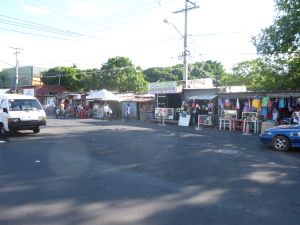
I’m walking a lot, seeing some of the same faces each day and they are beginning to warm up to me. The Nicos on the street in this area are not as friendly as the Ticos Heide and I encountered in Costa Rica when it comes to Gringos…seemingly suspicious…but I think it is largely due to the fact that I’m staying in a poor neighborhood. I am sure they can’t help but wonder what a tall (exceptionally good looking), apparently well-fed (only guessing they notice that!) Gringo is doing walking around their neighborhood. Familiarity in the same barrio, however, seems to be tempering the suspicion somewhat. I am at least starting to get smiles and “Buenos dias” from several of the security guards who seem to be everywhere.
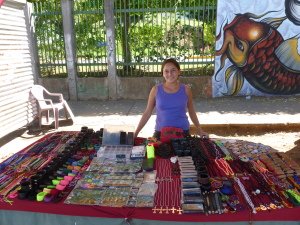
Many of these folks are poor by any standard. According to some of the statistics I’ve seen online and what I’ve been told by locals, the average Nicaraguan household income is about $200-300 per month. These folks are incredibly hard working people who use mostly hand tools for jobs that would have us at the Home Depot rental counter in a heartbeat (…more about that in another post). Poverty is visible everywhere…the infrastructure (electric, garbage collection, etc.), people scrabbling out a living as street vendors for everything imaginable, farmers selling their produce, etc. And yet, I have only been approached by a single person looking for a handout in all my walks. They may be poor but, in my limited experience, they are proud.
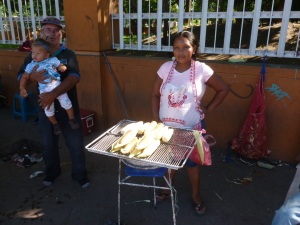
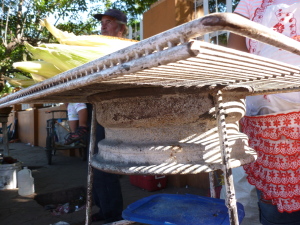 Roasting ears of corn over charcoal in an old car wheel for a grill
Roasting ears of corn over charcoal in an old car wheel for a grillMy not being able to speak the language is a humbling experience. I feel like a frustrated infant when it comes to being able to communicate with the local folks who undoubtedly have such rich stories to tell. I have a much deeper sense of empathy for those who come to the USA without knowing the language. Having the advantage of being highly educated and with financial resources, I am confident that I can figure it out and one way or another get along. To me, it’s an adventure that I savor. Those less educated poor immigrants who come to the USA without knowing our language must be absolutely terrified. Yet the promise of a better life for them and their families is irresistible. As I walk these streets, I often ponder what I would be willing to do to provide for my family if I were in the same boat.
I am finding the Nicaraguan people are delightful. In spite of my initial reception in the neighborhood, they are warm and friendly and only too eager to help the Gringo understand their language. Also, in spite of the poverty, the people I have met have amazing resiliency and hope. Perhaps its the time of the season (Christmas is approaching) but everywhere you go there are celebrations with friends and family. Family is very important here and there seems to be a closeness that is visible. In a land of abject poverty, optimism abounds.
Although I don’t think it’s right for our government to ignore the fact that people are entering our country illegally and I believe our immigration laws must be reformed and enforced, I am becoming far more sympathetic to the plight of the poor who speak no English. There is certainly a criminal element coming across our borders but overwhelmingly those who come across are poor, hard working people trying to support their families. Some of my friends delight in how we should “pack ’em up and send ’em all home.” Live among the poor in a foreign land for awhile. It’s not that simple.
Some additional photos of but one side of Nicaragua…
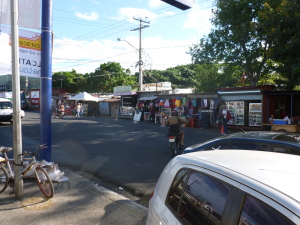
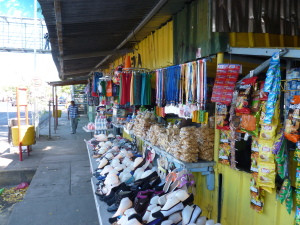
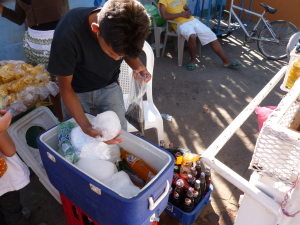
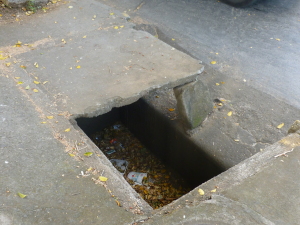
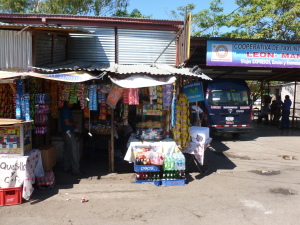
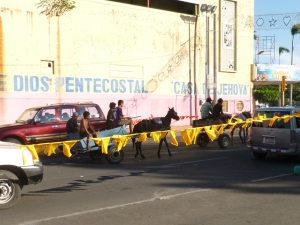
Gracias por compartir mi viaje conmigo. Hay más por venir.

I am sure it is very humbling to live among those people. Looking forward to hear more about your visit in Nicaragua. Stay safe and Christmas Blessings to you and Heidi.
Great post, we spent a few months in CR and Nicaragua in 2014. It certainly softens ones views on immigration. It made me question what lengths I would go to for my family without enough to eat. Just by the luck of the draw we were born here. Sobering.